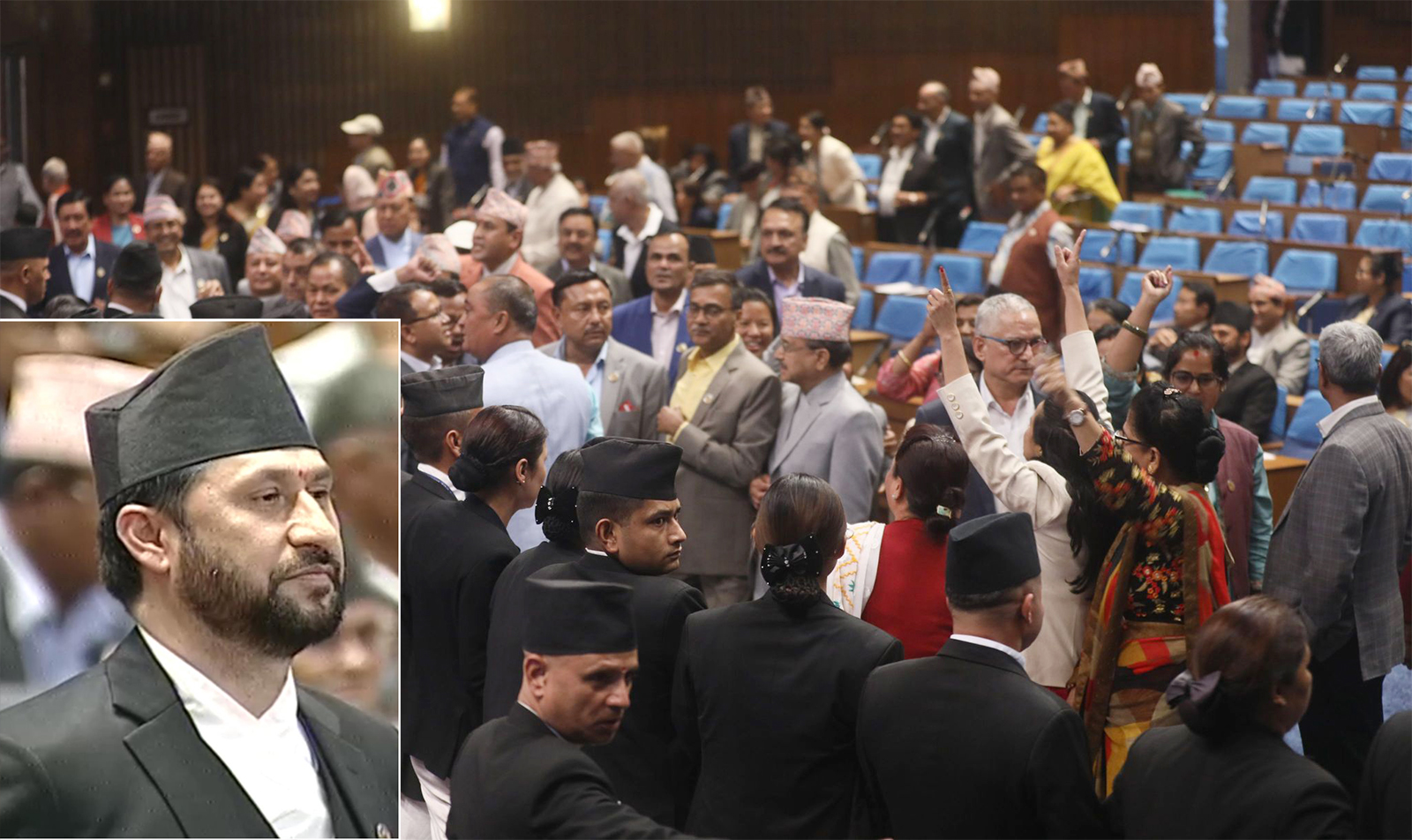Bafia Bill in Parliament: Complicated provision to separate bankers and businessmen
We use Google Cloud Translation Services. Google requires we provide the following disclaimer relating to use of this service:
This service may contain translations powered by Google. Google disclaims all warranties related to the translations, expressed or implied, including any warranties of accuracy, reliability, and any implied warranties of merchantability, fitness for a particular purpose, and noninfringement.


A bill related to Banks and Financial Institutions (BAFIA) has been submitted in the House of Representatives with the provision that the same person cannot be both a banker and a businessman. In the bill submitted by Finance Minister Barshman Pun in the House of Representatives last week, it is proposed to separate bankers and businessmen by providing that they cannot take loans from other banks and financial institutions if they have taken more than one percent of the paid-up capital of any bank.



Apart from this, the bill has made strict proposals on the relationship between bankers and businessmen by changing the limits of share investment and loans of companies, groups and family members.
In section 52 of Bafia, it is proposed that banks and financial institutions cannot provide any kind of loan or facility to a person related to them or a person who has significant ownership in any bank. At present, only one institution had such a provision. However, by adding substantial ownership and its definition, the bill has made a new proposal that loans cannot be taken from other banks and financial institutions. Clause 2 of the Bill amends the provisions relating to substantial ownership to one percent or more of the paid-up capital of the institution.
Similarly, there is another strict provision in the bill that a person who has borrowed more than one percent of the paid-up capital cannot be the director of the same bank and financial institution. This is a new arrangement. "A person whose total commercial debt taken by a related person or his family or a company or organization related to him and his family exceeds one percent of the paid-up capital of the bank and financial institution he wants to be a director of will be disqualified from becoming a director," the bill states.
This means that bankers are trying to prevent businessmen and businessmen from becoming bankers both on the basis of share investment and loans. For a long time, homework has been done to separate bankers and businessmen based on the conclusion that there is a problem in the financial sector because the same person runs both a bank and a business. Former finance minister Yuvraj Khatiwada, who raised the issue of separating banks and businessmen when he was governor about a decade ago, has now submitted a different argument. This is what should be done in principle.
This was right around 070/71. But, is now the right time to do this work or not?'' He questioned and said, 'because by deciding to increase the capital of banks and financial institutions by four times, businessmen were forced to leave the industry and put money in banks.' He said that the National Bank should see whether it is practical to separate bankers and businessmen now that it has increased four times. This problem will not be solved just because the businessmen cannot run the bank. Businessmen should also be given a chance to leave the bank," Khatiwada adds. What is an institutional share or a public issue?, we should give enough time and opportunity to sell that share.' He said that it should also be considered. "When a businessman leaves, another businessman doesn't come, how many people invest in the bank other than businessmen, if non-businessmen investors don't come, whether to bring in external investment or not, we have to do enough homework," he says.
Since then, Prime Minister Pushpa Kamal Dahal has started separating bankers and businessmen by making a law and has called on the parliamentarians to help in this. Last week, while answering the questions of UML MP Gokarnaraj Bista in the House, Prime Minister Dahal said that the government has made legal and policy arrangements to solve the problems that may arise when the same person or group is both a bank and a businessman. "When the resources in the country are more concentrated in limited households, it creates various types of risks and only a limited group will get returns, so to solve this situation, the total loan limit that can be taken by a person or group in the banking sector has been set," said the Prime Minister.
According to the current legal system, a person who is a director of a bank cannot take a loan other than the specified type, not only from the organization that he is the director of, but also from other financial institutions. According to which, banks and financial institutions are not allowed to provide any other type of loans to directors, chief executive officers or high management level officials of other licensed institutions except for education loans, hire purchase loans, house loans or material loans for household purposes in their personal name. But it is possible to take a government loan, term receipt, gold and silver collateral or credit card. It has also been explained in the instructions of the National Bank that the term "high management level official" refers to the official who holds a position two levels below the chief executive officer of the licensed institution. However, he has not stopped taking loans from other organizations in the name of his affiliated companies. Here, by taking advantage of the legal weakness, businessmen are taking loans from banks that they are not involved in. In the
bill, the regulatory process of the National Bank is also sought to be regularized and more effective. According to which, in order to make the monitoring of the utilization of the loan amount more effective, the bank and financial institutions have to monitor every 6 months whether the borrower has utilized the loan amount for the purpose for which the loan was given to the borrower or not. Currently, although it is mentioned that regular monitoring should be done by making a schedule, it is not specified that it is half yearly. Due to this, there is a tendency to monitor when it is good and not to do it when it is not good. Similarly, experts say that some organizations have a tendency to follow up after receiving complaints or complaints.
The system of executive chairman or managing director is going to be removed in banks and financial institutions. "A director may be re-appointed as a director for another term after the expiry of his term," the bill states. In the case of independent directors, the existing arrangement remains unchanged. Previously, the parliamentarians who were also directors of banks and financial institutions had revived the old system by adding the provisions of the executive chairman or managing director, which had been removed in the past, to the Act. Currently, there is a rule that the chief executive officer cannot work for more than two terms in the same organization. But directors can be appointed for as many terms.
Banks and financial institutions now have to appoint two independent directors, including at least one woman. Currently, there is a provision that there should be one independent director regardless of whether they are male or female. "When appointing directors of banks and financial institutions that have female shareholders, there should be at least one female director," the bill states.
There is a proposal in the bill that a person who is a director in any bank and financial institution cannot be a director in the Infrastructure Development Bank. Currently, directors of banks and financial institutions can also be directors of
infrastructure development banks. There is going to be a provision for microfinance institutions to issue IPOs for their borrowers as well. "D category financial institution considering the shares allocated for sale and distribution to the general public as 100 percent, from such shares, at least 40 percent of the shares must be allocated for its debtor members," the bill states. Through the
bill, strict arrangements are being made in the governance and debt recovery of banks and financial institutions. In the bill, there is a proposal to collect additional amount from the borrower if the borrower misuses or embezzles the loan provided by Nepal government, state government or national bank as a priority sector or by giving any concession or if such borrower is found to have done any act with the purpose of evading the revenue or duty to be paid or paid. "Related banks and financial institutions shall retain the interest and other concessions received by them for such loans and collect the interest and damages for the entire period of such loans and return them to the same entity from which the borrower received such concessions," the bill states. In the debt recovery process, the ownership and usufructuary rights of such property must be transferred in the name of the concerned person or organization when the mortgage property or security is auctioned through bidding.
Similarly, the bill states that it is necessary to make the debt recovery process more effective, 'if the debt is not recovered even after all the debt recovery actions are taken, the related banks and financial institutions can stop and confiscate the passports of the debtors and individual guarantors through any facility provided by the state. It can request the National Bank for the necessary arrangements to deprive the individual guarantor," the bill states.
'The institution may withhold other movable and immovable property owned by the debtor or the debtor is entitled to and collect its interest from such property in accordance with the prevailing law,' the bill says, 'If no one fails to sell the movable and immovable property under mortgage protection at auction, the bank and The financial institution will be able to take possession of it as specified.'' "A person who has not completed 25 years of age and who has exceeded 70 years of age will be ineligible to become a bank director," said the bill. At present there is no upper age limit for directors. "To become a director of a microfinance financial institution, one must have obtained a bachelor's degree and have worked for at least 3 years in an official position in the government of Nepal or an organization in a related field," the bill states.
It has been proposed to remove 'two per cent or more' of the paid-up capital and make it 'one per cent or more' in the provisions relating to substantial ownership in financial institutions. The National Bank has stated that the limit of share ownership has been reduced so as not to affect the management of the organization due to the large number of share ownership. In order to maintain good governance in the organization, the existing definition of 'affiliated person' has been amended and elaborated. According to which, now the executive head of the organization, the executive head of the subsidiary company, director or management level official, other persons specified by the National Bank, firms, companies or organizations and in the case of financial institutions wholly or partially owned by the Government of Nepal, the persons specified by the National Bank are also included in the definition of 'affiliated person'. is included. The concept of digital bank is also included in the
bill. Although the current Act covers the provision of specialized banks, there is no provision for digital banks. Dilliram Pokharel, co-spokesperson of Nepal Rastra Bank said that since many countries have already issued digital currency and Nepal has also researched its possibilities, the concept of digital bank has been included in the bill. The provision that this bank can carry out digital banking and financial transactions is in the bill. It is stated that this bank can accept digital currency and make payments, deposit collection, lending, and banking and financial transactions according to the provisions of the Act, other applicable laws, memorandum of association and regulations.
'It is difficult to find non-business investors'
Sunil KC, President - Nepal Bankers Association
It seems that bankers and businessmen are trying to be separated through the Bafia Bill. Why did this happen?

The arrangement may have been made to maintain institutional governance. However, this does not mean that there has been a problem in the financial sector. The main thing is that there is no conflict of interest while doing business. Also, good governance can be maintained through the instructions of the regulatory body, the internal policy rules of the organization. However, such laws are necessary if good governance is not maintained in an organization.
Being a businessman and a banker, there is a conflict of interest, and it is difficult to do regular work now?
I don't have that problem with the bank I'm affiliated with. However, how relevant is it to say that people who invest cannot become directors? Now the founding investors who want to exit the bank have not got permission. If the businessman is to be removed from the bank, he should be given ample opportunity to sell shares.
Now the same businessman has invested everywhere, the capital is also with them. Now when the businessmen are being told to sell the shares of the bank, can they find non-business investors who will buy their shares?
It may be difficult to find non-business investors in the current structure. What will you do if you do not find an investor who can buy the shares sold by the businessman tomorrow? Now the capital of the bank is around 7.5 trillion rupees. Most of them belong to industrialists. How many non-business investors with such a large capital?
If the businessman cannot be the director himself, is there a possibility to appoint a nominal director (dummy) and run the bank according to him or not? In the
bill, there are more provisions in terms of educational qualifications and experience of directors, so the possibility of a 'dummy' director as you mentioned is low. Since the directors have to be appointed by the general meeting, such a possibility is less likely. However, it cannot be said that Dummy will not come.
In terms of numbers, we have very few entrepreneurs and are doing business in all sectors of the three economies. Can bankers and businessmen be separated in this structure of the economy?
can practically be a problem.
Some bankers have been saying that they will withdraw investment from the bank. Is this an opportunity for them?
For that, a law should be made with sufficient options and time to withdraw investment.
प्रकाशित : चैत्र ११, २०८० ०६:५०

















